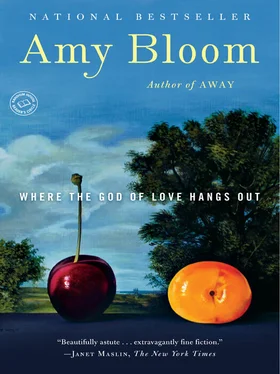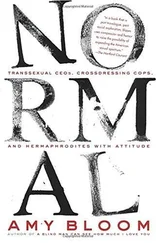A feeling of goodwill and confidence settled on me for no reason I can imagine.
“Hey,” I said, “let’s stay over. Here.”
My mother smiled and looked at Claudine.
“Perhaps we will just see how we feel,” Claudine said. “I am a little fatiguée.”
“Why don’t you take a nap before dinner,” my mother and I said simultaneously.
“Perhaps,” she said, and kept peeling.
I think now that I must have given Claudine the wrong impression, that she’d come expecting a doddering old lady, none too sharp or tidy these days, living on dented canned goods and requiring a short, sadly empty visit before she collapsed entirely. Julia, with a silver braid hanging down her broad back, in black T-shirt, black pants, and black two-dollar flip-flops on her wide coral-tipped feet, was not that old lady at all.
My mother gave Mirabelle a bowl of cut-up vegetables to put on the table, and she carried it like treasure, the pink radishes bobbing among the ice cubes. Claudine waved her hand around, wanting another cigarette, and my mother gave her a glass of red wine. Claudine put it down a good ten inches away from her.
“I am sorry. We have reservations. Lionel, will you arrange your car? Mirabelle and me must go after dinner. Thank you, Madame Sampson, for your kindness.”
My mother lifted her glass to Claudine. “Anytime. I hope you both come again.” She did not say any thing like “Oh no, my dear, please stay here,” or “Lionel, you can’t let Claudine drive into Boston all by herself.” I poured myself another drink. I’m still surprised I didn’t offer to drive, because I was brought up properly, and because I had been sure until the moment Mirabelle pulled the lime out of Claudine’s glass that I wanted to stay at the Ritz in Boston, that I had come only so that I could depart.
Mirabelle told my mother the long story of the airplane meal and the spilled soda and the nice lady and the bad little boy from Texas and Monsieur Teddy’s difficult flight squashed in a suitcase with a hiking boot pressed against his nose for seven hours. My mother laughed and admired and clucked sympathetically in all the right places, passing the platter of chicken and bowls of cucumber salad and minted peas. She poured another grenadine and ginger ale for Mirabelle, who watched the bubbles rise through the fuchsia syrup. She had just reached for her glass when Claudine arranged her knife and fork on her plate and stood up.
Mirabelle sighed, tilting her head back to drain her drink, like one of my father’s old buddies at closing time. We all watched her swallow. My mother made very strong coffee for Claudine, filling an old silver thermos and putting together a plastic-wrapped mound of lemon squares for the road. She doted on Mirabelle and deferred to Claudine as if they were my lovable child and my formidable wife and she my fond and familiar mother. She refused to let us clear the table and amused Mirabelle while Claudine changed into comfortable driving clothes.
Mirabelle and my mother kissed good-bye French-style, and then Claudine did the same, walking out the kitchen door without waiting to see if I followed, which, of course, I did. I didn’t want to be, I wasn’t, rude or uninterested; I just didn’t want to leave yet. Mirabelle hugged me quickly and lay down on the backseat. I made a little sweater pillow for her, and she brushed her cheek against my hand. Claudine made a big production of adjusting the Crown Victoria’s side mirror, the rearview mirror, and the seat belt.
“Do you know how to get to the city?” I asked in French.
“Yes.”
“And then you stay on—”
“I have a map,” she said. “I can sleep by the side of the road until morning if I get lost.”
“That probably won’t be necessary. You have five hundred dollars in cash and seven credit cards. There’ll be a hundred motels in the next fifty miles.”
“We’ll be fine. I will take care of everything,” she said. In very fast English she added, “Do not call me, all right? We can speak to each other when you get back to Paris, perhaps.”
“Okay, Claudine. Take it easy. I’m sorry. I’ll call you in a few weeks. Mirabelle, dors bien, fais de beaux rêves, mon ange.”
I watched them drive off, and I watched the fat white moon hanging over my mother’s roof. I was scared to go back into the house. I called out, “Where’s Buster? I thought he was coming up.” I had threatened not to come back if my brother didn’t show up within twenty-four hours.
My mother stuck her head out the front door. “He’ll be here tomorrow. He’s jammed up in court. He said dinner at the latest.”
“With or without the Jewelle?”
“With. Very much with. It’s only June, you know.”
“You don’t think she gives Bus a little too much action?”
“I don’t think he’s looking for peace. He’s peaceful enough. I think he was looking for a wild ride and she gives it to him. And she does love him to death.”
“I know. She’s kind of a nut, Ma.”
And it didn’t matter what we said then, because my lips calling her mother, her heart hearing mother after so long, blew across the bright night sky and stirred the long branches of the willow tree.
“Are you coming in?” she said.
“In a few.”
“In a few I’ll be asleep. You can finish cleaning up.”
I heard her overhead, her heavy step on the stairs, the creak of her bedroom floor, the double thump of the bathroom door, which I had noticed needed fixing. I thought about changing the hinges on that door, and I thought of my mouth around her hard nipple, her wet nightgown over my tongue, a tiny bubble of cotton I had to rip the nightgown to get rid of. She had reached over me to click off the light, and the last thing I saw that night was the white underside of her arm. In the dark she smelled of honey and salt and the faint tang of wet metal.
I washed the wineglasses by hand and wiped down the counters. When my father was rehearsing and my brother was noodling around in his room, when I wasn’t too busy with soccer and school, my mother and I cleaned up the kitchen and listened to music. We talked or we didn’t, and she did some old Moms Mabley routines and I did Richard Pryor, and we stayed in the kitchen until about ten.
I called upstairs.
“Do you mind living alone?”
My mother stood at the top of the stairs in a man’s blue terry-cloth robe and blue fuzzy slippers the size of small dogs.
“Sweet Jesus, it is Moms Mabley,” I said.
“No hat,” she said.
I realized, a little late, that it was not a kind thing to say to a middle-aged woman.
“And I’ve still got my teeth. I put towels in the room at the end of the hall. The bed’s made up. I’ll be up before you in the morning.”
“How do you know?”
“I don’t know.” She came down three steps. “I’m pretending I know. But it is true that I get up earlier than most people. I can make you an omelet if you want.”
“I’m not much of a breakfast man.”
She smiled, and then her smile folded up and she put her hand over her mouth.
“Ma, it’s all right.”
“I hope so, honey. Not that — I’m still sorry.” She sat down on the stairs, her robe pulled tight under her thighs.
“It’s all right.” I poured us both a little red wine and handed it to her, without going up the stairs. “So, do you mind living alone?”
My mother sighed. “Not so much. I’m a pain in the ass. I could live with a couple of other old ladies, I guess. Communal potlucks and watching who’s watering down the gin. It doesn’t really sound so bad. Maybe in twenty years.”
“Maybe you’ll meet someone.”
“Maybe. I think I’m pretty much done meeting people.”
Читать дальше












